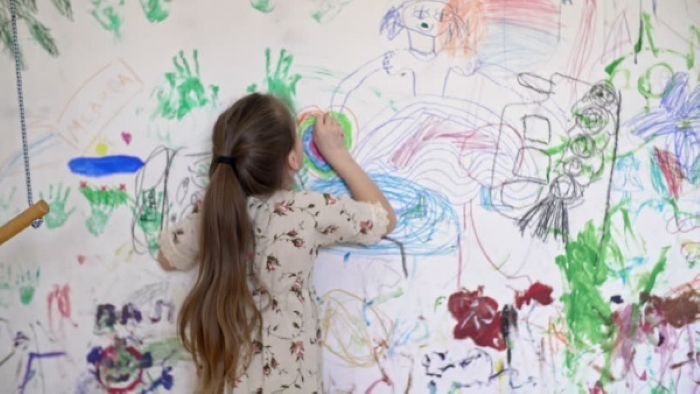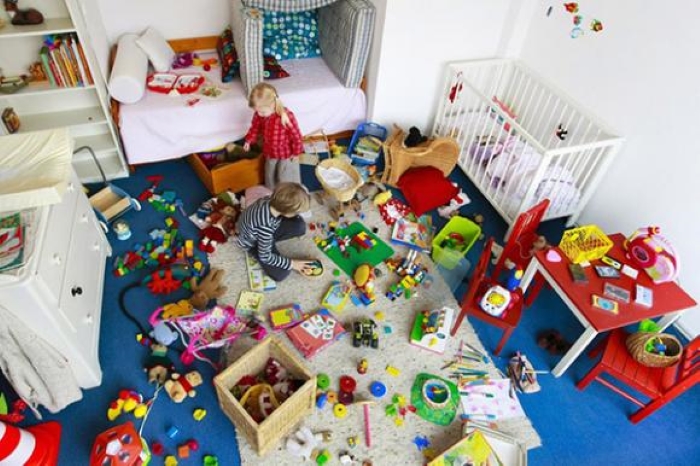Many actions of parents that they think are bad are actually signs of high IQ. The advice for parents is not to worry too much, because these things are actually signs of a child’s development.
Professor Li Mai Can, a famous expert in China in the field of Criminology and Child Psychology, once shared: “Some children may seem completely bad, but they are actually signs of high IQ. Parents should not blindly correct them, otherwise it will destroy the initiative in the child’s soul and affect brain development.”
In other words, before the age of 6, if a child has some “bad habits,” parents should not only not inhibit them, but also comply with them! Professor Romper of Harvard University (USA) pointed out that a child’s intelligence will stabilize before the age of 6, and before the age of 3, there are signs of high IQ. If a child has these “bad habits,” they may be developing towards high intelligence.
Below are 5 common “bad habits” in children with high IQ:
1. Doodling
Have you ever experienced the feeling when your clean walls at home are filled with “sinister symbols”? It’s really annoying! Although art comes from life, but when the child’s face is covered with doodles everywhere, it’s really hard to look straight at their “artistic cells.”

Illustration
But scientific research has shown that children who like to doodle will have an IQ at least 5% higher than normal people, and they usually have better imagination, thinking and expression skills than their peers.
At the age of 2 to 3, children enter a sensitive stage of painting. At this stage, children like to express their emotions through images and colors. If your child likes to doodle, it shows that they have rich imagination, creativity, and good artistic talent.
Of course, if you don’t want your walls and belongings to be labeled “art medals,” then arrange a doodle wall for your child, prepare a drawing board and some drawing tools for them.
2. Throwing things without order
Looking at the scene of “mess everywhere,” even your newly bought phone is not safe from accidents, it’s really frustrating!
If you think your child is challenging your limits, then you are wrong, this really needs to be followed! The act of throwing objects is actually an important lesson in exploration, helping children improve their awareness and satisfy their curiosity.
Through throwing objects, children will understand the different materials and weights of objects, the different sounds they make when falling, and the different shapes and positions they create. And to complete this action, it requires coordination between the child’s eyes, brain, and hands, which can be good exercise for their body coordination.

Illustration
Therefore, when you see your child likes to throw things, you just need to tidy up valuable and dangerous objects. The rest is to encourage the child to actively explore and let them throw to their heart’s content. When the child’s curiosity is satisfied, and they pass the sensitive stage of throwing, naturally, they will not throw random objects anymore.
3. Jumping from high places
Jumping, for children, is a new way of exploration, because they can experience different spatial feelings. Children have developed a sense of space since 7-8 months old, throwing things is part of this development process, a little bigger is crawling through holes, running and jumping, and finally jumping from high positions.
When children develop a sense of space, they are actually developing their thinking ability, so it should not be strongly hindered. Usually, children with a good sense of space will perform very well in math later on.
The child’s liking for jumping can also stem from imitation, this is also a way of learning and development for them. Moreover, through this way, children can consume excess energy, release surplus energy, and promote physical development.
Therefore, if your child always likes to jump from high positions, pay attention to creating a safe environment for them, and avoid injuries. For example, install barriers, soft mats at home. You can also guide children to engage in appropriate exercises, such as running, jumping rope, swimming, all of which are equally effective.
4. Always arguing
There was a survey about “What do you hate most about your child as they grow up?” which showed that the act of arguing makes more than 75% of parents headache, and surely all parents who have experienced it have a deep perception!

Illustration
Most people think that “arguing” is disrespectful to parents. But have you ever thought that it is a sign of a child’s cognitive development, starting to have their own thinking and evaluation?
When children start to have their own perspective on understanding and perceiving things, no longer blindly following their parents, and have the ability to express their opinions and thoughts, they may stand on the opposite side of you. This can be difficult to accept, but it is really part of a child’s development.
Of course, the child’s character and emotional state can also make them argue, if arguing happens too often or affects the parent-child relationship, then you need to communicate with the child to understand their intentions and true feelings, and solve the problem.
5. Disliking conversation
“Look at other people’s children, they greet everyone politely and obediently, but my child sees someone and immediately hides in the room, never speaking!”. Shy children are indeed not beloved, but is it really an “unforgivable crime”?
Psychological education expert Dian Hoanh Kiet has highly valued shy children. Shy children are not like extroverted children who are friendly to everyone, but they have more energy to pay attention to people and things around them, and their sensitivity to the environment and people is higher.
Of course, parents need to clarify the reason why the child doesn’t like to talk. If it is simply shyness, but they can maintain politeness when meeting people, not being self-conscious or arrogant, then there is no need to worry or blame too much.
If a child suddenly becomes unwilling to talk, there is a great change in their character, then you need to communicate deeper with the child. Find out what has happened to them that caused them to be hurt or shocked.





































